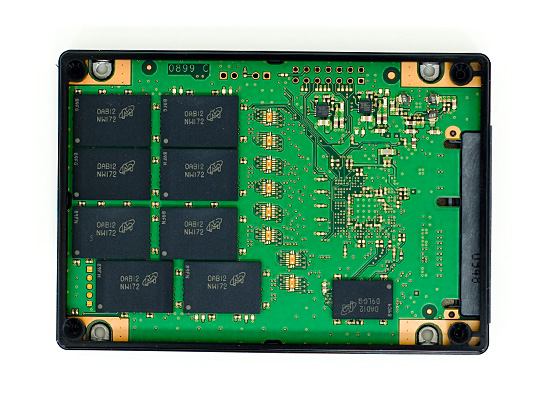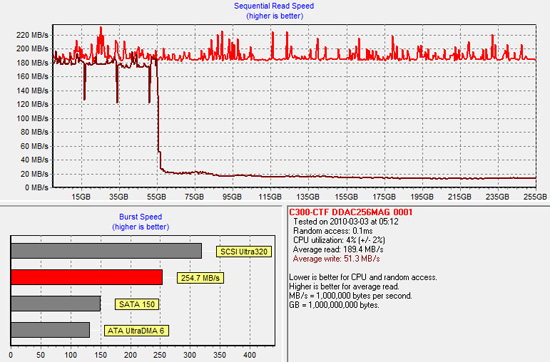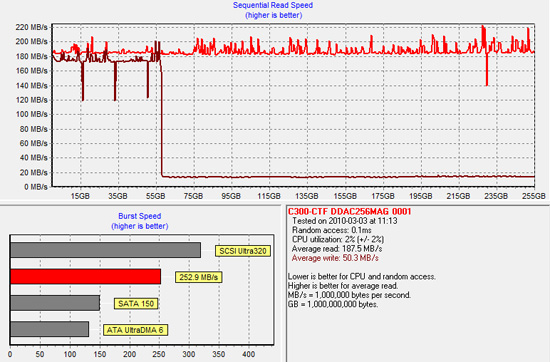Crucial's RealSSD C300: An Update on My Drive
by Anand Lal Shimpi on March 25, 2010 1:28 PM EST- Posted in
- Storage
Earlier this morning I published an article looking into the performance of 6Gbps SATA controllers, both integrated and off-chip. In it I mentioned my recently deceased Crucial RealSSD C300 that decided to up and stop working one day. Given that Crucial is selling these drives, I wasn't too happy with the outcome.

Inside Crucial's RealSSD C300
The drive would not longer be detected on POST. In fact, with the C300 connected to any machine I couldn't get any OS to boot; the system would just hang at drive detection. After a couple of weeks of toying with my dead drive, Crucial came back to me with an explanation of what's going on.
"We determined that the drive wasn’t bricked, but that it was very slow at powering up due to errors in the firmware tables that resulted in the characteristics you were seeing. We’re still investigating these errors."
I still don't know why the firmware tables developed errors, but presumably if your drive has found its way into this state then your data should still be intact. Now the second problem.
When I got my replacement drive I wanted to see how well the C300's TRIM function was implemented. I'd recently run into a couple of SSDs that don't appear to recover well after used LBAs are TRIMed. Unfortunately, the C300 joined the list. Here's a look at a sequential write across the entire 256GB C300 after I've peppered it with random writes:

Write performance does not look good. While parts of the drive can still write at around 180MB/s, the last 60GB of the drive are limited to about 20MB/s. A quick format across the drive should invoke the TRIM instruction for all LBAs and tell the C300 that it none of the data on the drive is needed and those blocks can be recycled immediately. Performance should restore to new (constant ~200MB/s across all LBAs). Unfortunately, it doesn't:

In fact, performance got worse. Let's TRIM the drive once more for good measure:

Ouch. The drive won't come back, period. The only way to restore it to full performance is to perform a secure erase. Now this scenario is a corner case and it's not one I'd expect any desktop user to run into in a short period of time. However, it is possible that after several months or years your drive might find itself in a situation where its performance never recovers. Crucial's response to the issue is below:
"...we have been able to replicate the circumstances where performance after a format does not return to acceptable levels, and we have developed a solution. We plan to integrate this into our production line and we’ll make it available to current customers. We’ll send you the code after it’s been thoroughly tested.
As we’ve mentioned before, we perform thousands of hours of testing before going into production. And as you’ve shared in one of your articles, testing every single combination of hardware, software and usage is highly improbable. We really appreciate all the feedback you have provided, as it allows us to make sure that our ongoing product improvements and updates are as comprehensive as possible."
Despite Crucial's promises of doing a ton of validation, things like this do get through. It's not a problem specific to Crucial, remember that Intel had a similar situation crop up in its early X25-M days. This isn't the first SSD to fail on me either. It's because of problems like these that I recommend waiting before jumping on any new, unproven SSD. Just a heads up in case you're thinking about making the jump anytime soon. If you are interested in how the C300 performs, take a look at its results in our new SSD Bench database.










49 Comments
View All Comments
NT78stonewobble - Friday, March 26, 2010 - link
Agreed. To me harddrives are a known and developed technology. However I do know that they fail once in a while which is why I back up my personal stuff once in a while.I can't be arsed to get expensive tape backups for the bigger stuff that can either be redownloaded (70 gb steamfolder anyone?) or reripped (dvds).
However as you mention you do get kind of a warning sign that harddrives are going to brick soon (telltale clicking or other noise, performance and so forth).
How the hell am I gonna hear that my brand new expensive SSD is gonna crap out on me in xxx amount of time?
NT78stonewobble - Friday, March 26, 2010 - link
Also: Mechanical harddrives are so cheap nowadays that you can buy extras just for raid 1/5/10/1+0/0+1 or just backup drives to increase security of the data. Atleast for an average consumer.Personally when I buy a new harddrive to increase capacity I keep the old one for more regular backups.
How about an article on data security for the home user?
semo - Thursday, March 25, 2010 - link
Hi Anand,do you have any comments on why C300's random read is slower than the random write. In all other SSDs is the opposite isn't it? Do you have any comments?
Crucial's explanation makes sense. I still think that in this day and age a non-vital system component shouldn't prevent POST (you should be able to boot from USB or another internal drive).
viewwin - Thursday, March 25, 2010 - link
Any luck testing the Sandforce 1200 drives yet?0x00 - Friday, March 26, 2010 - link
i'd also really like to see a test of some sf1200 drive here :) if possible, please also test the performance loss with compressed or encrypted files.i'm required to use full disk encryption software and i wonder whether sandforce, due to this compression thingy, will work much worse than other SSD drives.
pmonti80 - Thursday, March 25, 2010 - link
Seriously Anand thanks for these kind of things, they make our us lifes easier.straubs - Friday, March 26, 2010 - link
No kidding. If Anand wasn't reporting on this and making the manufacturers fix their products, we'd all be losing out. Someone has to do the detailed testing that others aren't doing. So thanks.georgekn3mp - Thursday, March 25, 2010 - link
It was aready known that SSD's in a RAID set could not get TRIM commands from the ICH10R chipset until very recently...but does this mean that the Crucial really isn't implementing TRIM in a single drive?Intel just updated the RAID Storage Manager for ICH10R and now it CAN pass TRIM slong...hopefully Marvell controllers can too.
merid14 - Thursday, March 25, 2010 - link
So, are you saying that the ICH10R chipset does TRIM now with any SSD that does TRIM? I'm very interested in this as I would like to raid a couple of SSD's. Thanks!529th - Friday, April 2, 2010 - link
Where did you get this info that a RAID-0 array can not utilize TRIM and is the source credible ?